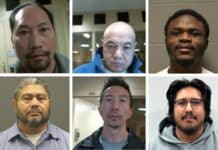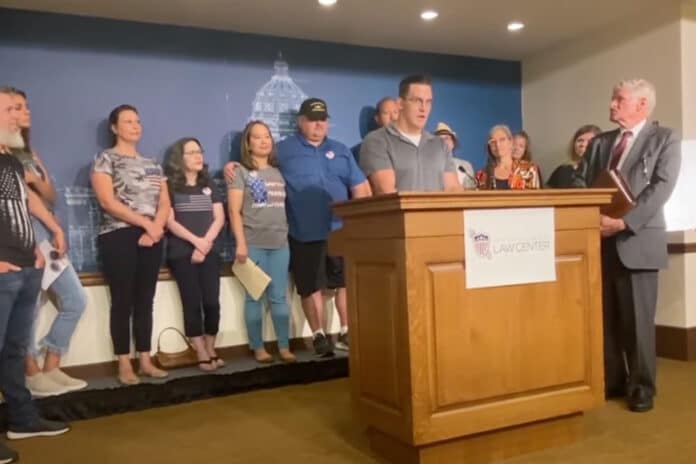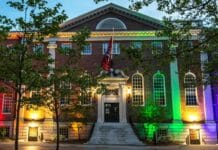On March 21, 2024, the federal Eighth Circuit Court of Appeals reversed the federal District of Minnesota’s dismissal of a discrimination and retaliation case where the Upper Midwest Law Center’s client, Aaron Norgren, had objected to the Minnesota Department of Human Services’ mandatory critical-race-theory and gender-nonbinary “trainings” and was later refused the chance to interview for a promotion.
Aaron Norgren was a security counselor at the DHS’s St. Peter MSOP facility. The DHS had required Aaron to undergo so-called “trainings” entitled “How to Be Antiracist” and “Understanding Gender Identity and Expression: Moving Beyond the Binary.” The “trainings” were expressly designed to “change minds for life.” The “antiracism” training mandated a minute of silence for George Floyd and directed Norgren to stop using the phrase “I am not a racist” as a defense, to admit to their version of the word “racist,” and to accept the United States as the root of racist ideas. The gender non-binary training required Aaron to refrain from telling others that their gender identities are wrong.
Aaron objected to the “antiracism” program because he believed it was forcing employees to accept ideas that are contrary to the colorblind equality required by the law, and thus was itself discriminatory. He objected to the gender non-binary program because he believed it forced him and others to contradict his sincerely held religious beliefs. Aaron believes that God created men and women in His image and likeness, and only created them male and female, at birth. As such, Aaron does not believe there are more than two genders, or that one’s gender is separate from his or her biological sex, or that it can change from how they were created by God at birth. That’s not controversial, it’s Genesis 1:27.
Aaron sought exemptions from these requirements. He was denied. The objections were just the beginning, though. Aaron was then denied the day off due to a winter storm during a winter in which he had just gone into the ditch on the way home a week before. Then, after he charged the DHS with discriminating against him in the federal Equal Employment Opportunity Commission (EEOC), DHS denied him the opportunity to interview for a position that he had been told he qualified for a couple months before. What happened to lead them to change their mind about his qualifications? Well, just three weeks before he applied, he had filed that charge of discrimination.
The federal District of Minnesota had dismissed Aaron’s claims, holding that he didn’t allege enough in the complaint to show that he could eventually win the case. But the Eighth Circuit Court of Appeals reversed the district court. The Eighth Circuit revived Aaron’s claims for discrimination and retaliation under Title VII. The court held that Aaron’s allegations that he was not allowed to interview for a better position were close enough in time to his charge of discrimination that they give rise to an inference of discrimination and retaliation, and that his claim that he had been told he was qualified for the same type of position in the past was also sufficient to create an inference of discrimination and retaliation.
With this reversal, the case is sent back down to the district court for “discovery.” That means that now, with UMLC representing him, Aaron will seek to prove, through direct testimony and circumstantial evidence, that DHS did, in fact, take the actions against him that it did because of his beliefs and his objections to these efforts to indoctrinate him against his beliefs. Discovery will go on for several months before the parties likely ask the district court to rule on what’s known as summary judgment — this means that we and the state will each submit papers to the court arguing that with the facts shown in discovery, we are entitled to judgment. It remains possible that there could be fact disputes that require an eventual trial down the road.
The Aaron Norgren case is an example of the type of case we bring at UMLC. We stand up alongside individuals who are courageous enough to stand against wrongful government or private sector action in employment, education, election integrity, and so on. We take these cases free of charge thanks to our generous donors.
And these are not easy cases — the government has our tax dollars supporting it and its attorneys, and access to a number of defenses and immunities that make lawsuits hard to win. As I like to say, with all of their defenses and immunities, often provided to them by courts beyond the text of the law, government attorneys have to resist the urge to think they hit a triple when they wake up on third base. But we bring these kinds of cases to hold the government accountable for its actions and to provide support and hope for folks in the Upper Midwest who don’t necessarily agree with the government’s approved and preferred messages and mantras. We look forward to bringing this case and our other cases to a successful conclusion.
Please make sure to stay informed by subscribing to UMLC’s newsletter at umlc.org, and check out our social media pages on Facebook, X (formerly Twitter), Instagram, and LinkedIn for timely updates on our work.











